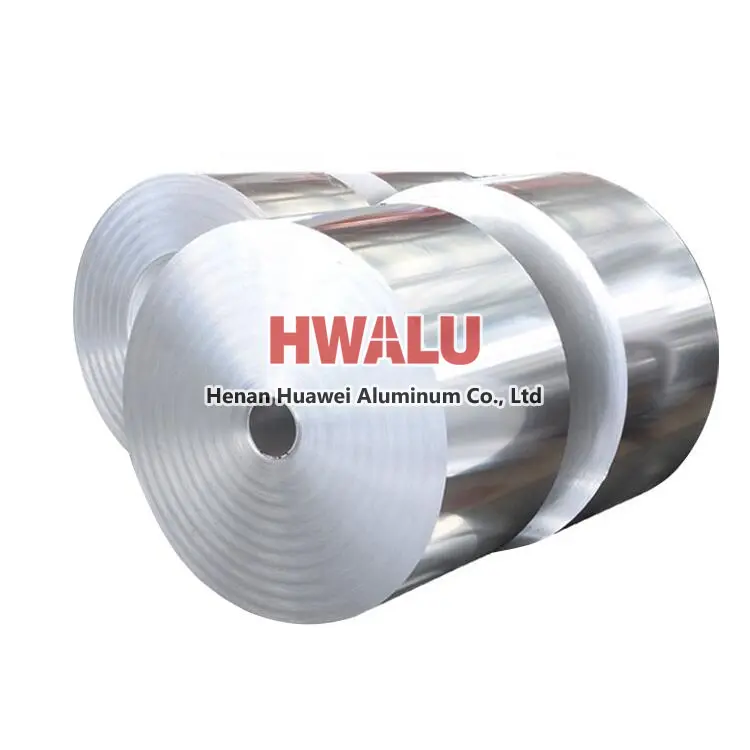What is thick aluminum foil Thick aluminum foil refers to a special type of aluminum foil that is thicker than regular aluminum foil. Usually, the thickness of the thick aluminum foil is between 0.2-0.3 mm, which is much thicker than regular aluminum foil. Like conventional aluminium foil, thick aluminum foil also has excellent properties, such as high electrical conductivity, fire prevention, corrosion resis ...
why aluminum foil is used to wrap chocolate? How does aluminum foil protect chocolate? We found that both the inside and outside of the chocolate must have the shadow of aluminum foil! One is that chocolate is easy to melt and lose weight, so chocolate needs packaging that can ensure that its weight does not lose, and aluminum foil can effectively ensure that its surface does not melt; The second is the c ...
What is aluminum foil for transformers Aluminum foil for transformers refers to the aluminum foil used to make transformers. A transformer is an electrical device used to transform alternating voltage or current, consisting of an iron core and a winding. A winding consists of an insulated coil and a conductor, usually copper wire or foil. Aluminum foil can also be used as a winding conductor. Aluminum foil fo ...
Introduction Welcome to Huawei Aluminum, your premier destination for high-quality 8011 O Temper Aluminum Foil in various micron thicknesses. As a reputable factory and wholesaler, we pride ourselves on delivering top-notch aluminum products that meet and exceed industry standards. In this detailed guide, we will explore the specifications, alloy models, applications, and advantages of our 8011 O Temper Aluminum ...
1235 aluminum foil for battery 1235 aluminum foil is an aluminum alloy foil with a higher content in the 1000 series. It is a high-quality aluminum alloy material that can be widely used in many fields. It can be widely used in food foil packaging and medicinal foil packaging. It can also be used in for battery packaging. Battery foil 1235 element content Alloy Si Fe Cu Mn Mg Cr Ni Zn V Ti ...
What is industrial aluminum foil roll Industrial aluminum foil rolls are jumbo aluminum foil, commonly used in various industrial applications. Industrial aluminum foil is a thin, flexible sheet made of aluminum metal, produced by rolling aluminum sheets cast from molten aluminum through a series of rolling mills to reduce thickness and create uniform specifications. Industrial aluminum foil rolls are different ...
Single-sided carbon-coated aluminum foil is a breakthrough technological innovation that uses functional coatings to treat the surface of battery conductive substrates. Carbon-coated aluminum foil/copper foil is to uniformly and finely coat dispersed nano-conductive graphite and carbon-coated particles on aluminum foil/copper foil. It can provide excellent electrostatic conductivity, collect the micro-current ...
Why Can Aluminum Foil Conduct Electricity? Do you know how aluminum foil conducts electricity? Aluminum foil is a good conductor of electricity because it is made of aluminum, which has a high electrical conductivity. Electrical conductivity is the measure of how well a material conducts electricity. Materials with high electrical conductivity allow electricity to flow through them easily because they have many ...
Is aluminum foil a good insulator? It is certain that aluminum foil itself is not a good insulator, because aluminum foil can conduct electricity. Aluminum foil has relatively poor insulation properties. Although aluminum foil has certain insulating properties in some cases, its insulating properties are not as good as other insulating materials. Because under normal circumstances, the surface of aluminum foi ...
Battery Aluminum Foil VS Household Aluminum Foil Battery aluminum foil and household aluminum foil have similarities and differences in many aspects. Similarities between battery aluminum foil and household aluminum foil. Similarities Material basis: Both household foil and battery foil are made of high-purity aluminum materials. Aluminum foil has the basic properties of aluminum, such as light weight, good ...
The performance differences between 3003 aluminum foil and aluminum plate are primarily related to its physical and mechanical properties and its intended application. Here are some of the main differences in performance: Formability: 3003 Aluminum Foil: 3003 aluminum foil is highly formable and can be bent, formed and folded easily. It is often used in applications that require flexibility and ease of mold ...
Only China, the United States, Japan and Germany can produce double zero foils with a thickness of 0.0046mm in the world. From a technical point of view, it is not difficult to produce such thin foils, but it is not easy to efficiently produce high-quality double-zero foils on a large scale. At present, many enterprises in my country can realize the commercial production of double zero foil, mainly including: ...











